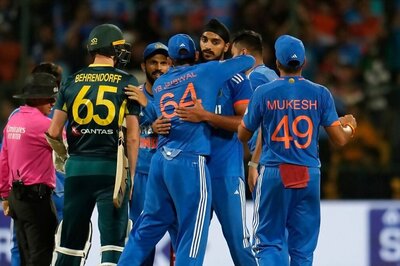
views
Even as intense campaigns have been launched for universalisation of exclusive breastfeeding of children for the first six months, compliance rate in Odisha continues to be abysmally low.
Only around 24.8 per cent of the lactating mothers in the State adhere to exclusive breastfeeding over the prescribed six months, according to the Annual Health Survey 2010-11 report, released recently.
The paradox lies in the fact that Odisha is the top performing State among the nine BIMARU (Bihar, Madhya Pradesh, Odisha, Assam, Rajasthan, Jharkhand, Chhattisgarh, Uttarakhand and Uttar Pradesh) ones chosen for the survey in terms of initiation of breastfeeding within an hour of birth. But it slips to seventh among the nine States in terms of sustaining exclusive breastfeeding through the six-month period.
As high as 71.5 per cent of children in the State are breast-fed within one hour of birth against 69.6 in Assam, 66.9 in Chhattishgarh, 63.2 in Uttarakhand and 61.5 per cent in Madhya Pradesh.Exclusive breastfeeding practices through six months has made significant ground in Chhattishgarh, with almost half of its population in compliance, followed by Jharkhand at 45.6 and Assam at 39.2 per cent. Only Rajasthan and Uttar Pradesh fare worse than Odisha with 24.7 per cent and 17.7 per cent respectively.
The WHO and the Government of India have recommended that children should be exclusively breast-fed for the first six months __ which entails that not even water should be given to the children in the period __ as it not only protects the infants from various life-threatening diseases and infects such as diarrhoea and pneumonia, but also promotes strong immunity, growth and nutrition levels among them.
The irony manifests in the districts too as the backward and tribal-dominated districts fare better than their more developed and advanced coastal counterparts. The impoverished district of Kandhamal has shown a very appreciable compliance to exclusive breastfeeding at 57.2 per cent along with Nuapada at 48.4 per cent, Nabarangpur at 46.8 per cent and Koraput at 41.5 per cent.
In contrast, in the industrial hub of Angul district, only 5.1 per cent of children between 6 and 35 months of age were found to have been exclusively breast-fed for at least six months. In the most urban districts of Cuttack and Khurda, the rates have been 35.7 per cent and 35 per cent respectively.
According to experts, low level of awareness coupled with commercial inclinations among the physicians has led to such a situation. Early initiation has shot up due to a significant rise in institutional deliveries in the State, but sustaining exclusive breastfeeding over at least six months remains a problem area.
Doctors, who are the prime refuge of the mothers during any problem, are not coming forward to educate them about the benefits of exclusive breastfeeding. They still have the tendency to prescribe milk substitutes at the slightest of instance, according to Breastfeeding Promotion Network of India (BPNI) State Coordinator Dr Arabinda Mohanty.




















Comments
0 comment